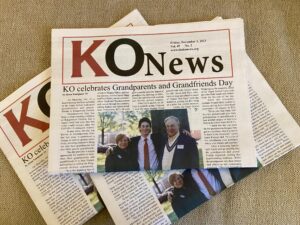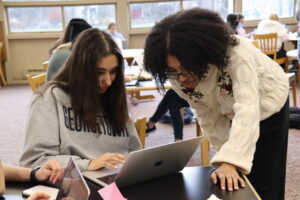December 04, 2023
Beyond the Byline: KO Journalists Gain Skills and Confidence
by Cathy Schieffelin
Teacher of English and Journalism
Faculty Advisor for the KO News
During my seven years of teaching journalism and serving as the faculty advisor for the KO News, I’ve come to realize how essential the skills of a journalist are. Students who serve as reporters and writers in the KO community – through the journalism course or as a staff member of the KO News – are developing key 21st-century skills:

• strong social skills and the ability to listen
• flexibility and initiative
• creativity and communication
• collaboration and leadership
Social Skills and the Art of Listening
We live in a world where so much communication is done digitally – and so often superficially. Simply sitting down for a conversation with another person and truly listening can be challenging, but it’s something KO journalists must do regularly. A recent book by longtime journalist Kate Murphy, “You’re Not Listening: What You’re Missing and Why It Matters,” offers a fascinating look at the lost art of listening. Murphy writes:
“Listening goes beyond just hearing what people say. It’s also paying attention to how they say it and what they do while they are saying it, in what context, and how what they say resonates within you . . . Done well and with deliberation, listening can transform your understanding of the people and the world around you, which invariably enriches and elevates your experience and existence. It is how you develop wisdom and form meaningful relationships.” 
As new journalism students approach their first interview with a long list of prepared questions, tips, and advice, they nevertheless find themselves feeling uncertain or nervous. And they should. But through practice, they learn how to ask better questions and, even more importantly, to truly listen to what sources are saying (and not saying).
Each time I assign a new article in my journalism class or wrap up a planning meeting with the KO News staff, I’m filled with anticipation as I imagine all of the interviews that will be taking place around campus, over phone calls, or even on Zoom as students strengthen their social skills and become better listeners as they strive to tell KO’s many stories.
Flexibility, Initiative, and Time Management
KO journalists also develop key skills simply through scheduling interviews. Crafting an email to an unfamiliar source, finding time to schedule multiple interviews for an article, and knowing how to follow up tactfully when sources don’t respond are challenges they don’t often face in traditional classes. These hurdles require students to step outside their comfort zone, manage their schedule and be adaptable.
Creativity and Communication
KO journalists also grow as communicators as they write for an authentic audience and receive detailed feedback from a teacher or editor. They come to see that what they write and how they write it matters. Students aren’t revising an article for a better grade – they’re producing their best writing because their name is attached to the story.
A few years ago, the KO News staff crafted a mission statement for the paper, a testament to what they saw as the duty of a reporter.
The statement reads in part:
“We vow to provide reliable, accurate information for readers and to be a reflection and celebration of the community as a whole.”
To live up to this pledge, KO journalists must also be creative and connected as they generate article ideas to best tell the varied stories of the KO community.
Leadership and Collaboration
Each semester, as my journalism elective wraps up, I encourage every student in the class to become a reporter for the KO News, and many do. By joining the paper’s staff, students develop a new set of skills as they realize the importance of collaboration and take on various leadership roles as a department head, a managing editor, or editor-in-chief.
Every month, the staff meets for a planning meeting to connect over pizza, critique the previous issue, and generate ideas for the upcoming issue. Two weeks later they come together again on a Sunday morning to make final edits and collaborate as they lay out the 20-page print issue of the paper on the InDesign desktop publishing platform. During all of these meetings, the students feel a genuine sense of camaraderie as they take the lead, listen, ask questions, and support one another.
As much pleasure as I take in witnessing this kind of in-person collaboration and leadership, I’m just as impressed with all the work that’s done behind the scenes, most of it unseen by me, as editors communicate on text chains, share suggestions, and comments on Google docs, and connect with one another in person to ensure that articles are well-sourced, well-written and delivered on time.
Last year’s editor-in-chief, Jordan DiMauro ’23, reflected on her time on the paper in her final Wyvern’s Tale column. Her words sum up the growth in confidence and delight students experience as they plunge into journalism and savor its rewards:
“Taking journalism and publishing my articles scared me when I was a freshman, but now I can’t imagine not continuing with journalism in the future. Taking the risk allowed me to find something that I truly enjoy and something that shaped me as a student, as well as a person.”
Thinkers
Blog Main News
